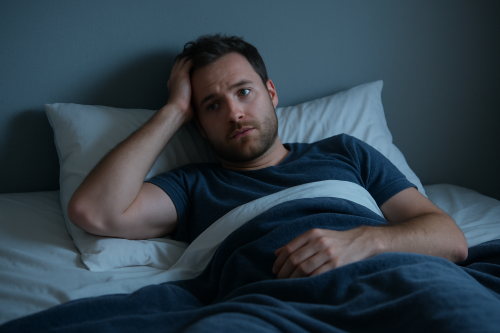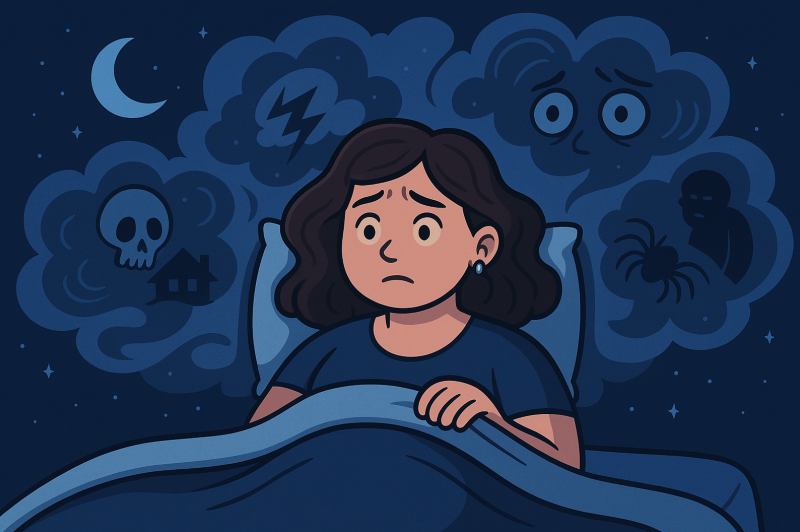
Anxious thoughts often show up just as the world quiets down. Here’s why nighttime can feel so intense—and how to ease it.
By Sergio Toledo
Editor-in-Chief, Heed to Heal
Introduction
There’s something about nighttime that seems to turn the volume up on everything we’ve been trying to push away. The thoughts we’ve ignored all day come flooding in. Our heart races, our breath shortens, and sleep—something so natural—suddenly feels impossible.
If you’ve ever laid in bed feeling overwhelmed by worries, regrets, or racing thoughts, you’re not alone. Nighttime anxiety is incredibly common—and it’s not just in your head.
Why Anxiety Intensifies at Night
During the day, we have distractions. Work, conversations, errands, noise. All of it keeps our minds busy enough to keep anxious thoughts in the background. But when the world goes quiet, our nervous system doesn’t always follow suit.
Your brain, finally unoccupied, begins to process the things it didn’t have time to earlier—fears, doubts, unresolved emotions. And for those who are already prone to anxiety, the lack of stimulation at night can feel like emotional whiplash.
There’s also a biological component. Cortisol, your body’s stress hormone, has a rhythm that can spike unpredictably if your system is dysregulated. And if you’ve been under chronic stress, your body may not easily transition into rest mode.
Common Nighttime Triggers
Understanding what fuels your nighttime anxiety can be helpful. Here are a few common triggers:
- Anticipatory thoughts – worrying about the next day, upcoming responsibilities, or what you “should have done.”
- Physical stillness – when your body finally slows down, sensations like tension or discomfort become more noticeable.
- Overthinking patterns – without noise or distractions, negative thought loops can grow louder.
- Loneliness or disconnection – nights can bring emotional vulnerability, especially if you’re feeling unsupported.
- Sleep pressure – the more you “try” to sleep, the harder it becomes, creating a cycle of frustration and anxiety.
What Can Help Soften the Edges
There’s no one-size-fits-all solution, but there are gentle ways to support yourself before bed. Instead of forcing sleep, focus on creating an environment where rest feels more possible—even if you don’t fall asleep right away.
- Create a wind-down ritual. Something as simple as turning off screens, dimming the lights, and playing soft music can cue your body that it’s time to slow down.
- Journal or brain dump. Let your thoughts out before bed—not to fix them, just to get them out of your head and onto paper.
- Practice body-based grounding. Try gentle stretches, progressive muscle relaxation, or simply placing your hands over your heart and belly as you breathe.
- Reframe the pressure to sleep. You don’t have to “fall asleep” right now. You’re just resting—and that’s still healing.
- Consider white noise or soothing sounds. A sound machine, calming playlist, or nature sounds can quiet the mind.
Final Thoughts
Nighttime anxiety doesn’t mean you’re weak or broken—it means your nervous system is still trying to keep you safe, even when there’s no threat.
Be gentle with yourself. Let the night be a space for softness, not performance. You don’t have to clear every thought. You don’t have to be perfectly calm. You just have to be here.
Even in the quiet, even in the chaos, you’re allowed to rest.
References:
- American Psychological Association. “Why Anxiety Strikes at Night”
- Cleveland Clinic. “Why Anxiety Can Feel Worse at Night”
- National Sleep Foundation. “Anxiety and Sleep”
- Harvard Health Publishing. “How to Calm Your Mind Before Bed”
- Anxiety and Depression Association of America. “Tips to Manage Nighttime Anxiety”
Originally published by Heed to Heal, 07.14.2025, under the terms of a Creative Commons Attribution-NonCommercial-NoDerivatives 4.0 International license.







